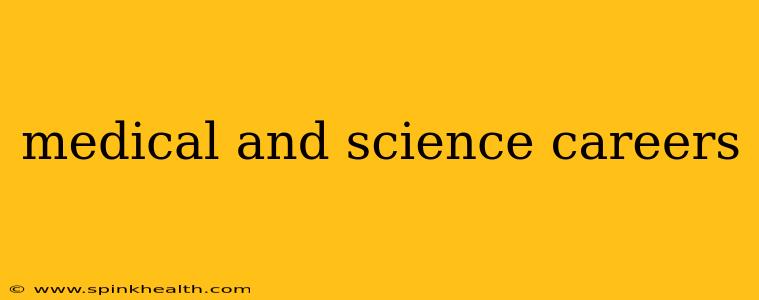A World of Discovery: Exploring Medical and Science Careers
The world of medicine and science is a vast and ever-evolving landscape, brimming with opportunities for those driven by curiosity, a desire to help others, and a passion for discovery. From the intricacies of the human body to the mysteries of the universe, countless career paths beckon those with a scientific mind and a compassionate heart. Let's embark on a journey to explore some of the fascinating possibilities within this dynamic field.
My name is Dr. Evelyn Reed, and for over 20 years, I've worked as a physician and researcher, witnessing firsthand the incredible impact that individuals in medical and science careers have on the world. This exploration will draw on my personal experiences and extensive knowledge of the field.
What are some high-demand medical careers?
The demand for healthcare professionals is consistently high, driven by an aging population and advancements in medical technology. Some of the most sought-after medical careers include:
-
Physicians (various specialties): From cardiology to oncology to pediatrics, the options are vast. The path requires extensive education and training, but the rewards are immense – both in terms of personal fulfillment and financial stability. Specializations are constantly evolving, so the field always offers something new and exciting to learn.
-
Registered Nurses (RNs): RNs are the backbone of the healthcare system, providing direct patient care in a variety of settings. Opportunities exist in hospitals, clinics, schools, and even private residences. Nurses play a critical role in patient recovery and overall well-being.
-
Physician Assistants (PAs): PAs work alongside physicians, providing medical care under supervision. Their versatility and ability to handle a wide range of tasks make them invaluable members of healthcare teams.
-
Medical Technologists: These professionals analyze samples and conduct tests, providing crucial diagnostic information for physicians. Their meticulous work is essential for accurate diagnoses and effective treatment plans.
-
Pharmacists: Pharmacists dispense medications, counsel patients on medication use, and monitor drug interactions. They are critical in ensuring patients understand and safely utilize their prescriptions.
What are some high-demand science careers?
Science, in its broadest sense, fuels innovation across countless industries. High-demand science careers often overlap with the medical field but extend far beyond it:
-
Data Scientists: With the explosion of big data, data scientists are in high demand across multiple sectors, including healthcare. Analyzing complex datasets to identify trends and improve outcomes is critical for advancements in research and treatment.
-
Biotechnologists: Biotechnologists work on the cutting edge of biological research, developing new drugs, therapies, and diagnostic tools. This field requires a strong understanding of biology and chemistry.
-
Genetic Counselors: These professionals advise individuals and families about inherited diseases and genetic conditions, playing a crucial role in reproductive health decisions.
-
Environmental Scientists: Understanding and addressing environmental challenges is critical for public health. Environmental scientists analyze pollution, develop solutions to environmental problems, and contribute to sustainability efforts.
-
Software Engineers (Bioinformatics): Bioinformatics combines biology, computer science, and information technology to analyze biological data. Software engineers in this field are essential for developing tools and algorithms used in genomics, proteomics, and other areas of biological research.
What kind of education do I need for a medical career?
A career in medicine usually requires a minimum of a bachelor's degree, followed by professional schooling like medical school (for physicians) or nursing school (for RNs). Many other medical professions require specific degrees, certifications, or licensing. The level of education needed varies widely depending on the specific career.
What kind of education do I need for a science career?
Science careers also vary greatly in their educational requirements. A bachelor's degree is a common starting point, but many advanced positions require master's or doctoral degrees. Specific certifications or licensures may also be necessary depending on the chosen career path.
What is the job outlook for medical and science careers?
The job outlook for both medical and science careers is generally positive, with many fields experiencing significant growth. However, specific job markets can vary based on geographic location, economic conditions, and technological advancements. Staying abreast of industry trends and continuously developing one's skillset are crucial for success in these competitive fields.
This overview only scratches the surface of the incredible opportunities available in medical and science careers. The future holds untold possibilities for those who dare to explore, innovate, and contribute to improving the lives of others and furthering our understanding of the world around us. Remember to research specific careers within these fields that align with your interests and skills. The journey may be challenging, but the rewards—both personal and professional—are truly immeasurable.

